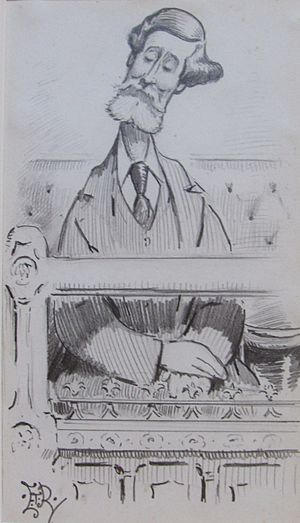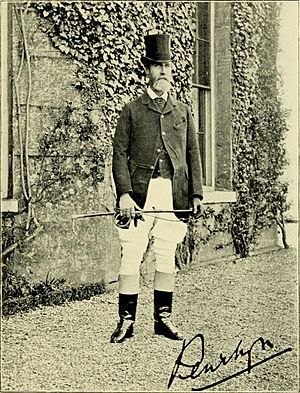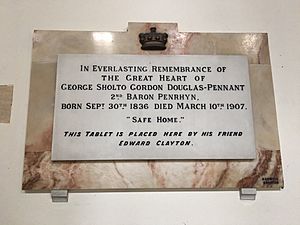George Douglas-Pennant, 2nd Baron Penrhyn facts for kids
George Sholto Gordon Douglas-Pennant, 2nd Baron Penrhyn (born September 30, 1836 – died March 10, 1907), was an important landowner in Wales. He owned the Penrhyn Quarry, which was a very big slate quarry in North Wales. Slate was a popular material used for roofs and other building parts.

Contents
Early Life and Education
George Sholto Gordon Douglas-Pennant was born in Yorkshire, England, on September 30, 1836. His father was Edward Gordon Douglas, who later became the 1st Baron Penrhyn. George's mother, Juliana Isabella Mary, came from a family that owned a huge amount of land in North Wales, including the Penrhyn Quarry.
In 1841, his father added the name Pennant to his own. This was because his wife had inherited so much property. In 1866, his father was given the title of Baron Penrhyn.
George went to school at Eton College and then studied at Christ Church, Oxford University. He thought about joining the army, but his father wanted him to focus on other things. However, he always stayed interested in military matters. He became a captain in a volunteer army group that included many workers from his family's Penrhyn Slate Quarry. Later, he became an Honorary Colonel.
Political Career
In 1866, George was elected as a Member of Parliament (MP) for Caernarvonshire. He was a member of the Conservative Party. He held this position until 1868. After he lost the election that year, his father fired 80 quarry workers because they had not voted for George.
He was elected as an MP again in 1874. However, he lost his seat in 1880.
Running the Penrhyn Quarry
When his father died in 1886, George became the 2nd Baron Penrhyn. He then took over the management of the family's large estate. The Penrhyn Estate was huge, covering over 26,000 acres. The family also owned the major slate quarry in Bethesda. This quarry could make a lot of money when it was busy.
Before George took over, his father had allowed the quarry workers to have a committee that helped manage parts of the quarry. In 1885, the quarries were not doing well financially. George was given full power to fix things. One of the first things he did was to stop the workers' committee from having any power. He wanted to be fully in charge.
Under his strong management, the quarries became busy and successful again. However, there were big disagreements between Lord Penrhyn and his workers.
The Great Strikes
A major strike began in 1897. Lord Penrhyn responded by closing the quarries completely. There was a big discussion about this in the House of Commons. But Lord Penrhyn refused to change his mind, and eventually, the workers had to give in and return to work.
Lord Penrhyn did not like trade unions. He believed that he should deal directly with his workers and not allow outside groups to get involved. Because of this, a second major strike, known as the Great Strike, started in late 1900. The quarries were closed again for a long time.
When the quarries reopened, about 600 workers who were not part of a union came back to work. Lord Penrhyn refused to hire back the workers who had led the strike. He also refused to recognize any trade union officials.
In 1903, Lord Penrhyn sued a newspaper called The Clarion for writing an article that said he was cruel to his workers. He won the case and was given £500 in damages. Lord Penrhyn always felt he was being fair and wanted to make sure that non-union workers were treated justly. In 1907, he even gave his workers a 10 percent bonus on their wages. This was because bad weather had stopped work at the quarries.
Hobbies and Interests
Lord Penrhyn loved horse-racing and breeding horses. He joined the Jockey Club in 1887. He had some success with his horses. For example, in 1898, his horse King's Messenger won the Goodwood Cup. Another horse, Quaesitum, won both the Chester Cup and the Queen's Vase in 1894.
He was also a very good shot. But his favorite hobby was fishing, where he was exceptionally skilled. From 1882 to 1891, he was the master of the Grafton hounds, which meant he led a group for fox-hunting.
Lord Penrhyn also served as a deputy-lieutenant for Carnarvonshire. He was also a county councillor for the Llandegai area.
Death
Lord Penrhyn passed away on March 10, 1907, at the age of 70. He died at his home in London. He was buried near one of his country homes in Wicken.
Family Life
Lord Penrhyn was married two times. His first wife was Pamela Blanche Rushout. They married on August 23, 1860. They had one son and six daughters, including Violet Douglas-Pennant. Pamela passed away in 1870.
On October 21, 1875, he married Gertrude Jessy Glynne. She was the great-niece of the Prime Minister William Ewart Gladstone. With Gertrude, he had two sons and six daughters. Sadly, both of his sons died while serving in the First World War.
 | Kyle Baker |
 | Joseph Yoakum |
 | Laura Wheeler Waring |
 | Henry Ossawa Tanner |



